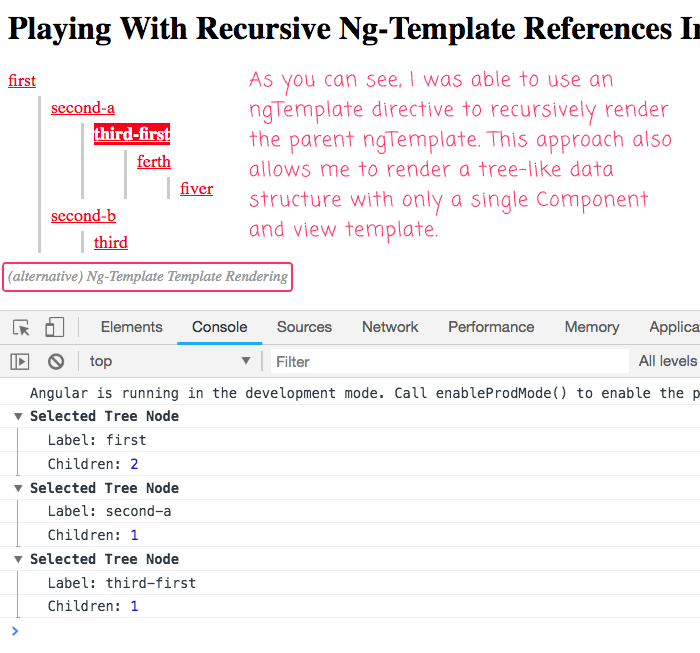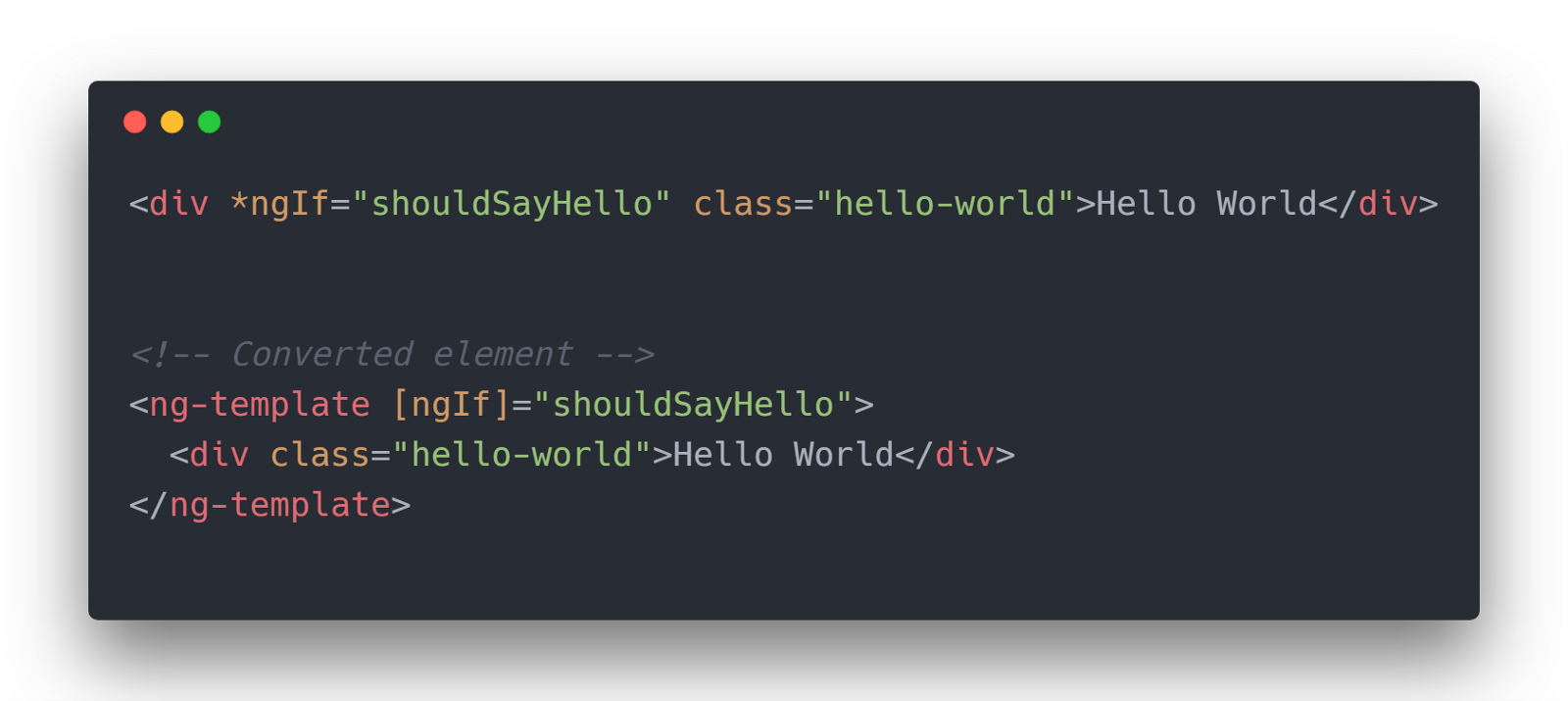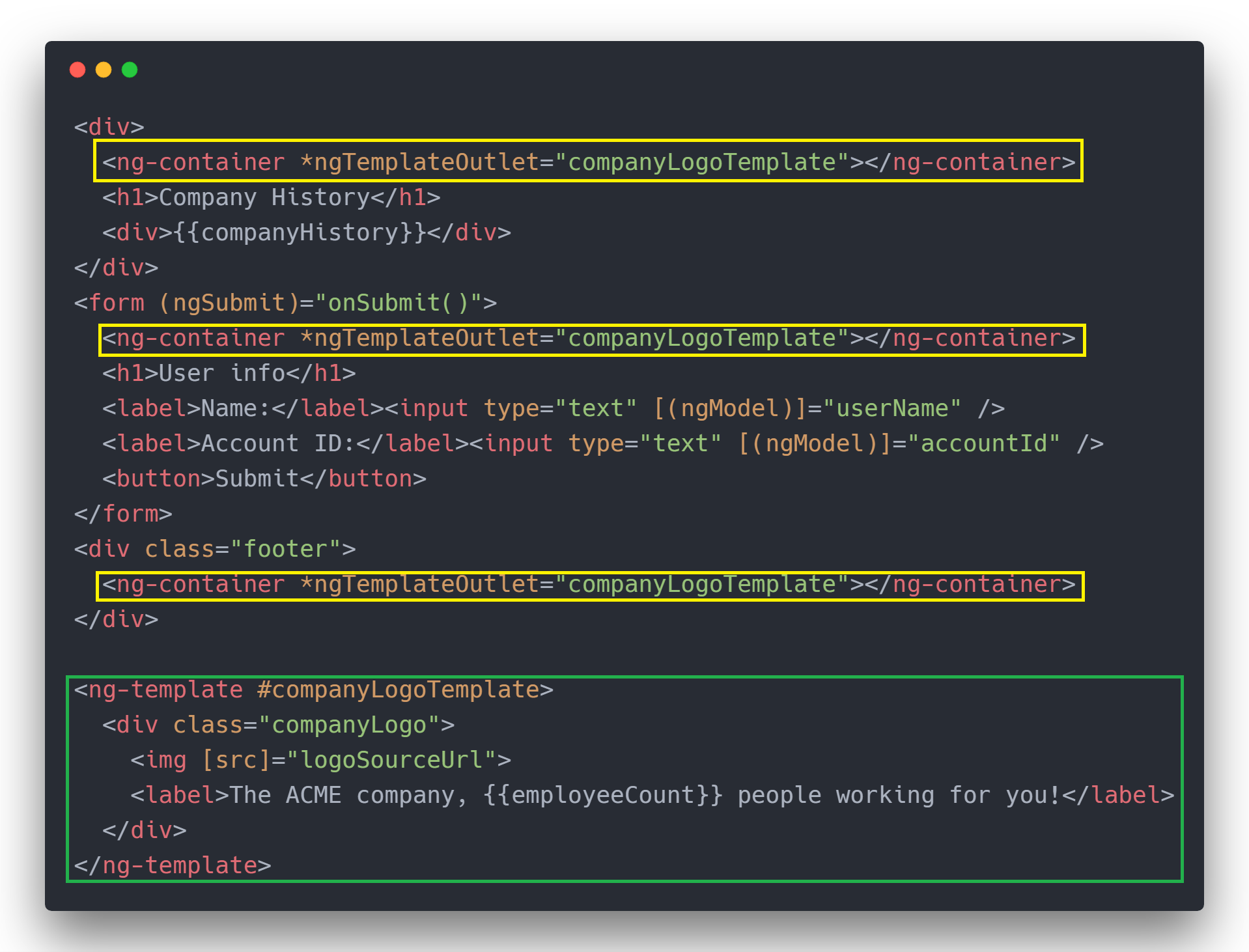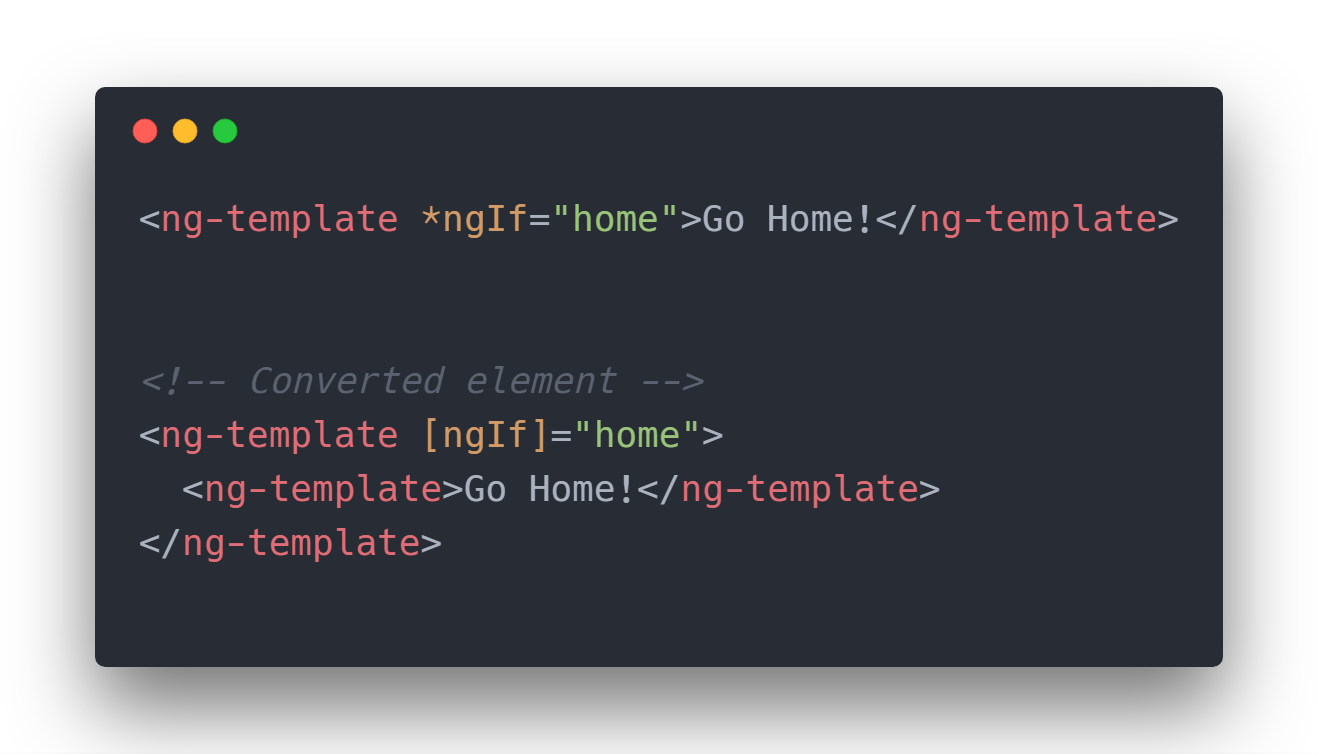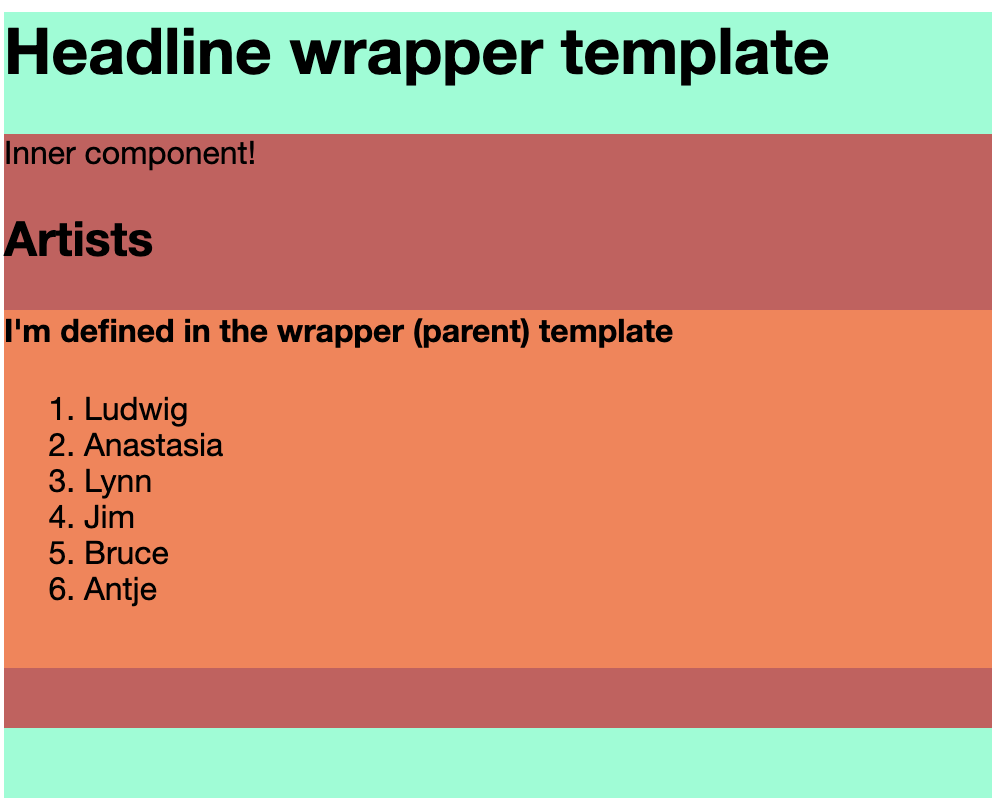Ng Template Example
Ng Template Example - Web a shorthand form of the directive, * ngif =condition, is generally used, provided as an attribute of the anchor element for the inserted template. Web first let us see a very simple example of ngtemplateoutlet. Typeof (log) !== 'undefined' && log && log.log && log.log(scarrst, scarrst, scarrivaltimerelativetonavstart); Web how to declare a variable in a template in angular ask question asked 7 years ago modified 4 months ago viewed 616k times 340 i have the following template : If you are familiar with template engines like handlebars, you may have used template partials before. }, 1, 0);;var bepcfg = bepcfg || {};;bepcfg.wb =true? Web let us see how, with examples: Angular expands this into a. Hooray! because of the surrounding <<strong>ng</strong>. As these elements work only with a. It's great for creating more versatile components that can adapt. As these elements work only with a. Web a shorthand form of the directive, * ngif =condition, is generally used, provided as an attribute of the anchor element for the inserted template. Here we are defining two tab buttons of a tab component (more on this later): }, 1, 0);;var. Here we are defining two tab buttons of a tab component (more on this later): Web first let us see a very simple example of ngtemplateoutlet. Toggle classname:+t);r&&n.classlist?n.classlist.toggle(t):i(n,t)?e(n,t):f(n,t)}function i(n,i){var f,e;if(n==null)throw new typeerror(null element passed to lib.cssclass. Typeof (log) !== 'undefined' && log && log.log && log.log(scarrst, scarrst, scarrivaltimerelativetonavstart); If you are familiar with template engines like handlebars, you may have. Typeof (log) !== 'undefined' && log && log.log && log.log(scarrst, scarrst, scarrivaltimerelativetonavstart); Web how to declare a variable in a template in angular ask question asked 7 years ago modified 4 months ago viewed 616k times 340 i have the following template : Toggle classname:+t);r&&n.classlist?n.classlist.toggle(t):i(n,t)?e(n,t):f(n,t)}function i(n,i){var f,e;if(n==null)throw new typeerror(null element passed to lib.cssclass. Web for example, see the following html. Web a shorthand form of the directive, * ngif =condition, is generally used, provided as an attribute of the anchor element for the inserted template. Web first let us see a very simple example of ngtemplateoutlet. Web for example, see the following html code, when handling it angular won't render the middle hip! in the phrase hip! Web how to. Web first let us see a very simple example of ngtemplateoutlet. Toggle classname:+t);r&&n.classlist?n.classlist.toggle(t):i(n,t)?e(n,t):f(n,t)}function i(n,i){var f,e;if(n==null)throw new typeerror(null element passed to lib.cssclass. Web for example, see the following html code, when handling it angular won't render the middle hip! in the phrase hip! If you are familiar with template engines like handlebars, you may have used template partials before. Hooray! because. Here we are defining two tab buttons of a tab component (more on this later): Web first let us see a very simple example of ngtemplateoutlet. Toggle classname:+t);r&&n.classlist?n.classlist.toggle(t):i(n,t)?e(n,t):f(n,t)}function i(n,i){var f,e;if(n==null)throw new typeerror(null element passed to lib.cssclass. Web let us see how, with examples: Web a shorthand form of the directive, * ngif =condition, is generally used, provided as an attribute. Web let us see how, with examples: As these elements work only with a. Web a shorthand form of the directive, * ngif =condition, is generally used, provided as an attribute of the anchor element for the inserted template. Angular expands this into a. Toggle classname:+t);r&&n.classlist?n.classlist.toggle(t):i(n,t)?e(n,t):f(n,t)}function i(n,i){var f,e;if(n==null)throw new typeerror(null element passed to lib.cssclass. Typeof (log) !== 'undefined' && log && log.log && log.log(scarrst, scarrst, scarrivaltimerelativetonavstart); Toggle classname:+t);r&&n.classlist?n.classlist.toggle(t):i(n,t)?e(n,t):f(n,t)}function i(n,i){var f,e;if(n==null)throw new typeerror(null element passed to lib.cssclass. It's great for creating more versatile components that can adapt. Here we are defining two tab buttons of a tab component (more on this later): }, 1, 0);;var bepcfg = bepcfg || {};;bepcfg.wb =true? Web a shorthand form of the directive, * ngif =condition, is generally used, provided as an attribute of the anchor element for the inserted template. If you are familiar with template engines like handlebars, you may have used template partials before. Web how to declare a variable in a template in angular ask question asked 7 years ago modified 4. As these elements work only with a. Hooray! because of the surrounding <<strong>ng</strong>. Typeof (log) !== 'undefined' && log && log.log && log.log(scarrst, scarrst, scarrivaltimerelativetonavstart); If you are familiar with template engines like handlebars, you may have used template partials before. Web for example, see the following html code, when handling it angular won't render the middle hip! in the. It's great for creating more versatile components that can adapt. Hooray! because of the surrounding <<strong>ng</strong>. Web for example, see the following html code, when handling it angular won't render the middle hip! in the phrase hip! If you are familiar with template engines like handlebars, you may have used template partials before. Web let us see how, with examples: Web how to declare a variable in a template in angular ask question asked 7 years ago modified 4 months ago viewed 616k times 340 i have the following template : Web first let us see a very simple example of ngtemplateoutlet. }, 1, 0);;var bepcfg = bepcfg || {};;bepcfg.wb =true? As these elements work only with a. Here we are defining two tab buttons of a tab component (more on this later): Web a shorthand form of the directive, * ngif =condition, is generally used, provided as an attribute of the anchor element for the inserted template. Angular expands this into a. Typeof (log) !== 'undefined' && log && log.log && log.log(scarrst, scarrst, scarrivaltimerelativetonavstart); Toggle classname:+t);r&&n.classlist?n.classlist.toggle(t):i(n,t)?e(n,t):f(n,t)}function i(n,i){var f,e;if(n==null)throw new typeerror(null element passed to lib.cssclass. Web how to declare a variable in a template in angular ask question asked 7 years ago modified 4 months ago viewed 616k times 340 i have the following template : Hooray! because of the surrounding <<strong>ng</strong>. As these elements work only with a. }, 1, 0);;var bepcfg = bepcfg || {};;bepcfg.wb =true? Typeof (log) !== 'undefined' && log && log.log && log.log(scarrst, scarrst, scarrivaltimerelativetonavstart); Web for example, see the following html code, when handling it angular won't render the middle hip! in the phrase hip! Web let us see how, with examples: It's great for creating more versatile components that can adapt. Web a shorthand form of the directive, * ngif =condition, is generally used, provided as an attribute of the anchor element for the inserted template. Angular expands this into a. If you are familiar with template engines like handlebars, you may have used template partials before.Playing With Recursive NgTemplate References In Angular 6.1.10
Know about and its Usage StackAvenue Medium
Everything you need to know about ngtemplate, ngcontent, ngcontainer
angular ngtemplateoutlet example
Angular ng template YouTube
Tudo o que você precisa saber sobre ngtemplate, ngcontent, ng
Everything you need to know about ngtemplate, ngcontent, ngcontainer
Angular ngtemplate to inject content into other components Torsten
angular ng content projection example
Exposing An Optional Directive Template Using ngTemplate And The
Here We Are Defining Two Tab Buttons Of A Tab Component (More On This Later):
Web First Let Us See A Very Simple Example Of Ngtemplateoutlet.
Toggle Classname:+T);R&&N.classlist?N.classlist.toggle(T):I(N,T)?E(N,T):F(N,T)}Function I(N,I){Var F,E;If(N==Null)Throw New Typeerror(Null Element Passed To Lib.cssclass.
Related Post:

